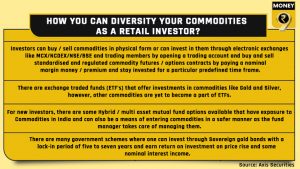Commodities exposure can diversify investment portfolio by lowering total risk
Investing in commodities may also act as a strong buffer against inflation, geopolitical crises, and economic cycles.

Commodities have expanded the range of investment tools available to traders, arbitragers, and hedgers, depending on their investment or business purpose. Commodities as an asset class have evolved as a result of the establishment of commodity futures indexes and, later, investment options benchmarked against these indices.
Commodities are an asset class that is essentially independent of those of stocks and bonds. Thus, broad commodity exposure can help diversify a stock and bond portfolio, thereby lowering total portfolio risk and increasing profits.
What does it mean for investors to have commodities as an asset class?
Today, investors have a variety of options for investing in commodities, ranging from mutual funds to exchange-traded funds (ETFs), covering anything from single commodity exposures to sector and broad-based commodity exposures.
Retail individual investors choose to invest in Gold and Silver through the Multi-Commodity Exchange of India (MCX). Industrialists’ tastes may shift toward industrial metals traded on the MCX or toward energy commodities such as crude oil.
Additionally, retail investors might also look for opportunities in the agriculture sector, which is mostly comprised of oilseeds, vegetable oils, spices, pulses, cereals, and softs. Agriculture commodities in the aforementioned areas are listed on both the MCX and NCDEX in many versions and with precise quality criteria.
“On a general term, most of the retail and institutional traders prefer to diversify the portfolio in equity and commodity classes in the ratio of 70:30 or 60:40 respectively. Similarly, investor taste preferences play a very important role while investing in commodities,” pointed out Sunandh Subramaniam, Senior Research Associate, Choice Broking.
Where can investors invest in terms of commodities to diversify their portfolios?
In India, trading in the commodity market starts at 9 am and goes on till 5 Pm on NCDEX and till 11.55 Pm for Bullions, Base-metal, and Energy segments while the market watchdog Sebi regulates the overall commodity market.
“An investor can create an excellent portfolio assembling various classes of commodities such as Agri-commodities, Bullions, Base-metal, and Energy while striking a perfect balance in the portfolio. There are many ways to invest in commodities such as ETFs, Mutual Funds, Futures, option and physical commodity investments (more particularly in precious metals),” explained Sandeep Matta, Founder, TRADEIT Investment Advisor.
That said, MCX and National Commodity and Derivatives Exchange (NCDEX) is the most popular exchange among traders. Futures contracts allow the trader to buy or sell a commodity at a set date and at a set time through contracts. Other ways could be buying physical commodities such as gold, silver, etc., or taking indirect exposure via commodity-related stocks.
“We have seen in the past, many commodities from Energy, Industrial metal and Agri sectors have given close to 100% returns and hence is an opportunity worth looking at,” pointed out Sunilkumar Katke, Head – Commodity and Currency, Axis Securities.

How commodity as an asset class differs from others?
Commodities not only have a low to negative correlation with other asset classes such as stocks, mutual funds, currency, and bonds, but they may also act as a strong buffer against inflation, geopolitical crises, and economic cycles.
“The commodity asset class serves as a safe-haven investment at the time of turmoil in the market or during a global economic slowdown, for example, Gold,” said Subramaniam.
Commodities as an asset class are fundamentally different from stocks and bonds, with returns that vary significantly. Additionally, commodities as an asset class can act as a hedge against inflation and benefit from economic cycles.
Agreed Manish Hingar, Founder, Fintoo: “Commodities provide an efficient portfolio diversification option as historically pricing in commodities has been less volatile as compared to equity and bonds. However, new investors should understand the risk and advantages of trading in commodities before making huge investments.”

